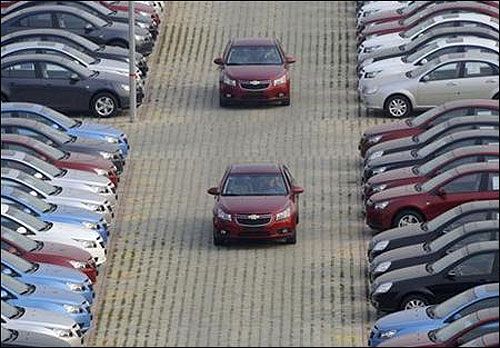 Dealer despatches will probably be a good signal of economic turnaround or further deterioration, says Devangshu Datta.
Dealer despatches will probably be a good signal of economic turnaround or further deterioration, says Devangshu Datta.
There was a good harvest in 2016, after two poor years. The Seventh Pay Commission also came through with a bonanza. Diwali saw fair bonuses across most sectors. The marriage season was coming up. Automobile dealers stocked inventory, anticipating high demand.
The post-demonetisation crunch has been painful. The two-wheeler segment has seen a six per cent fall year-on-year (y-o-y) in dealer offtake in November, compared to a year ago. The four-wheeler segment has seen four per cent rise y-o-y in dealer offtake.
We don’t have retail sales numbers yet. But, the Federation of Automobile Dealers Associations reckons sales have fallen between 30 and 50 per cent in various segments. Reports from Tata Motors indicate light commercial vehicles (CV) sales dropped 13 per cent, while medium and heavy CV sales fell 28 per cent. Showroom footfalls and conversion to sales are drastically down.
Most vehicles are financed. But, consumers have become cautious and pulled back. Another reason for consumers to hold off is the prospect of large year-end discounts, along with lower EMIs (equated monthly instalment) if banks cut rates.
In more cash-driven segments, big drops are seen. The second-hand market is said to have seen at least a 50 per cent fall in sales, since it is totally cash-driven. Reports say sales of Mahindra & Mahindra (M&M) utility vehicles are down by a third. M&M is hard-hit since UV sales are cash-driven.
The two-wheeler market is rural-oriented, with 50 per cent of sales in rural/semi-rural areas. Those deals are cash-driven, with initial payments in cash, and low EMI deployment.
Estimates suggest 30-40 per cent drop in sales in some segments. Both Bajaj and Hero have seen double-digit sales drops in November, at dealer level.
We will get a better sense of actual retail sales contractions when the December dealer numbers are released, in January. Dealers with unsold inventory will cut back December orders. As such, the next “one or two quarters” will be bad, even according to upbeat estimates by the finance minister.
A car or motorcycle is a big-ticket item and demonetisation has caused massive aversion to high consumption. The psychological effects could linger, even after cash availability eases, months down the line. Long-term collapse of consumption is a serious concern.
The automobile industry has an extremely long value chain and sustains a large system in terms of component suppliers. Any vehicle contains 25,000-30,000 parts. The industry stimulates the production of primary materials such as metals and plastic, as well as specialised glasses and bulbs. Vehicles also require highly sophisticated electronics and chips, and smart sensors, etc.
Selling a vehicle involves marketing, advertising, financing and insurance services. Repair, maintenance and servicing also creates employment. The health of the automobile industry is closely linked to the economy across both the manufacturing and services segments.
Since high car sales are associated with strong activity across multiple sectors, the old American saying that “What’s good for General Motors is good for USA” had a lot of truth to it in a simplistic way. A given company may not do that well. But, it’s hard to find a period when there has been strong overall economic growth without strong automobile sales.
Everybody concerned with the industry believes demand has been suppressed, rather than destroyed, by the cash crunch. Some concerns do exist as to whether there’s been a long-term change in consumption attitude. But, apart from automoble sales being a good indicator of economic health, a bounce would also indicate a return of consumer confidence.
People buy automobiles only when they feel confident about the future and under such circumstances, consumption across other sectors is high. Auto sales figures are also released every month and count as credible high-speed data.
Under normal circumstances, dealers have a good sense of market sentiment. Once dealers adjust to the shock of demonetisation, they are likely to be able to judge sentiment well. Dealer despatches will probably be a good signal of economic turnaround or further deterioration.
Keep tracking the auto numbers. This should give a good sense of when the economy does bottom out. The scenario could get worse before it gets better. But, once recessionary conditions start easing for the automobile industry, the entire economy will surely be on the mend.







